Monday, May 31, 2004
WE'RE BACK
Vermont was vert-er than vert, and our house feels like a palace after living in a room the size of half our upstairs for a month. We wander around like cats, sniffing and making sure it's really home. Outside, the gardens look like Sleeping Beauty's forest; I've never seen such chaos but it's sort of beautiful. Among the weeds: deep red peonies, dark blue lupine, and the fists of fat poppy buds. Maybe I'll just leave it all like this...
Twenty minutes after we arrived, Shirin appeared with Persian food for our dinner. Now that is friendship.
Unpacking. Laundry. And our own bed.
8:02 PM
|
Sunday, May 30, 2004
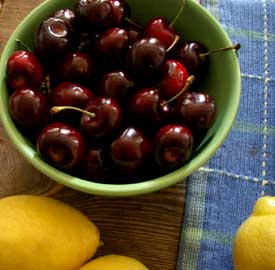
CERISES (cherries)
Our last day here is windy, bright and clear, as if the fast-moving air is sweeping all the particles of dust and pollen away and leaving unimpeded vision, accompanied by the music of the wind. J. is out on the back porch squeezing lemons for fresh lemonade for our party tonight - at the market this afternoon they were 7 for 1 Canadian dollar. There will be vin rouge, of course, but fresh lemonade seemed like a good way to inaugurate the summer. This isn't a holiday weekend in Canada, but today is a free museum day all across the city, and it's also one of the "Tour de l'Ile" cycling holidays, when many major streets are closed to encourage cycling and exploring. We couldn't do either of those things, but they seemed like a great idea. Closer to home, the residents of rue Garnier, two streets east of here, had their own street closed today for a "repas communitaire" - community meal - at noon: what we Americnas would call a block party.
At the market, shopping for tonight, we bought fresh cheeses, cherries, strawberries, salad things, and some grilled chicken that had been prepared at a North African shop with an outdoor grill. I'm making a platter of cold cooked asparagus, sliced tomatoes, little red potatoes in vinaigrette, and feta cheese. Other people are bringing wine, cake, chocolate, bread. Mon Dieu, how am I going to manage the withdrawal?
J. and I have been talking a lot about the differences between here and home; some are external and obvious, of course, but many are more internal. One of those is the lack of pressure in this society, which goes practically unnoticed by Montrealers, I imagine, but for us is not unlike that air-clearing breeze, leaving in its wake first a sort of confusing emptiness, that one eventually sees is filled with awareness of a whole different level of life, once the pressure is removed. I'll certainly be writing more about this, as well as contemplating how to integrate it into our life life back home.
Our internet access ends at midnight. We'll be home tomorrow night.
5:22 PM
|
Saturday, May 29, 2004
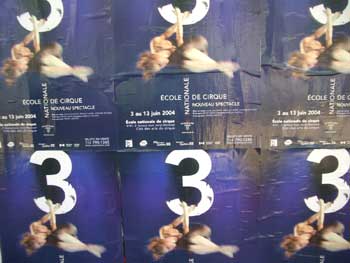
POSTERS FOR L'ECOLE NATIONALE DE CIRQUE (National Circus School)
Oh, winding down, winding down and it's so sad! Just one more night here, after this one. This evening we walked to our new neighborhood; it was cold here, but a sparkling night with a bright moon and stars that winked through the tree leaves. There were many cyclists out on the bike paths, and through the lace curtains of the houses we were able to get occasional glances into the lives of people on the Plateau, or hear the chatter of voices, music playing, a tenor practicing his arias.
We walked down the grand allee that leads to the fountain in the middle of the lake in Parc de la Fontaine and stood on the overlook for a while, watching the lights play in the tall jets of water, blown this way and that by gusts of wind. I don't think either of us really believes that we're going to come back and spend blocks of time here; it just seems too impossible. Of course, in January the walk we took tonight will be close to life-threatening, but that will make the warm sake at our favorite Japanese restaurant all the more inviting.
This afternoon we saw a newly-opened exhibit at the contemporary art museum, and were invited to take part in an open art workshop in the classroom. That was a lot of fun; there were three other adults and a high school class visiting from Manhattan, and we all worked on a collage project using photocopies of different views of the current, and past four, buildings that have housed the contemporary art museum. There is almost always a class going on there; we've looked through the window many times at the eager schoolchildren and the white-coated instructors, and enjoyed the projects that are often posted in a neaby exhibit space, but it was a lot more fun to actually take part and be able to talk to the instructors about the museum's education program.
After that we wandered around the periphery of a huge contruction site for a new science complex for UQAM (university of Quebec at Montreal). Taking pictures, and then spent a fine, completely unpressured hour at an Oriental rug dealer who was advertising a "liquidation sale". I love looking at carpets as much as I love looking at paintings, and we were fortunate to find a low-key but knowledgeable salesman who enjoyed talking about the trade and the specific rugs; we ended up in the upstairs gallery, sitting on piles of carpets, talking about Armenia. Then we came home and helped our landlady finish the small deck she's making in her garden.
Tomorrow night we're making dinner for our landlady's family and our neighbor, and then it will be time to clean the apartment, pack up, and say au revoir.
10:38 PM
|
Friday, May 28, 2004
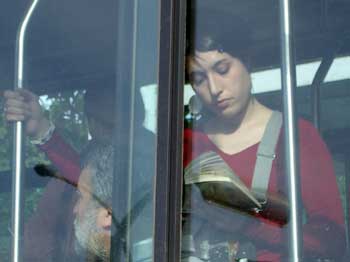
READING ON THE BUS
This morning we worked, made lunch, and then I went off by myself for a long - very long, as it turned out - walk. My destination was Waldman's, the best poissonerie (fish market) in Montreal (so I've read) but to get there I walked through the picturesque streets of our new neighborhood, took a long stroll through Parc de la Fontaine (where the beautiful fountain in the lake had just been turned on for the summer), and then across a good chunk of town on rue Roy, which has some interesting cafes and restaurants on its corners, finally coming to Blvd. St. Laurent and the famous fish market.
I have to explain that I am a fish market lover. Maybe it comes from growing up landlocked, far from the ocean, but still fond of fishing and fish. When I was in Paris, many years ago, one of my favorite things to do was wander along the fish stalls on Rue de Seine, gazing at the glistening piles of still-bright-eyed fish, the coral-colored langoustines, the spiny sea urchins. Today's destination didn't have the atmosphere of those wonderful Paris markets, but it had more fish, of more varieties, than I've ever seen, as well as octopus and squid, salted fish and frozen fish, and bags of fruits de mer, and eels, and live lobster. It was in a large, concrete-floored room with many counters and boxes where the fish were laid out and nearly covered with shaved ice: flat white flounder, whole salmon, huge tuna and shark ready to be cut into steaks, piles of silvery sardines, snow crabs moving their blue claws ever so slowly. I have no idea how to cook many of these fish; maybe if I become a good customer when we're here and ask a lot of questions I'll learn. Today I felt incomprehensibly shy, and bought only a filet of salmon.
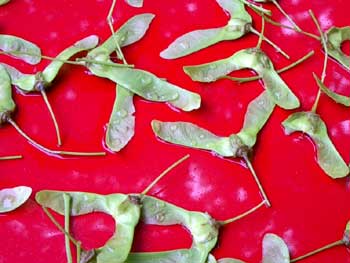
In yesterday's comments, Butuki wrote, "Is there anyone who can explain to me in terms that make sense just why things are so dangerous in the United States?" When I wrote the previous post, I hadn't yet read one of Denny's about living dangerously in Miami. There is no doubt in my mind that Canadian society is much gentler than ours, even in rural New England. I don't know the answer either, but it seems to me that one reason is that there is much less of a gap here between rich and poor, as well as less mythology about equal opportunity, which in the US so often leads to expectation, dashed hopes, and despair. The gap between promise and reality is so big, and getting bigger: how can it not lead to anger and violence? One clear difference is that there seems to be less awareness of economic class here. I noticed this yesterday, when we (the affluent new condo owners) had hired the services of an inspector. In the US, this person would be basically working-class, and unless we already knew him I doubt there would have been such a peer-like conversation or such ease among strangers; he would have been obsequious or he might have had a chip on his shoulder; there would have been some kind of social tension whether we wanted it or not.
In the US, the media presents a vision of "success" and glamour as if it is attainable by everyone, selling a manufactured idea of attractiveness and power that would turn every regular Joe into Donald Trump. This utterly unattainable vision is in the face of everyone, rich and poor, educated or not, immigrant or long-term citizen, and it seeps into every aspect of our lives. Along with the vision comes desire - and unrealized, impossible desire turns into a growing sense of failure and frustration. Besides, the desire never ends, no matter how affluent one has become.
Along with frustration, another major factor that breeds violence is an atmosphere of competitiveness and aggressiveness, and an acceptance of violence as a way to solve disputes or express one's dissatisfaction or frustration. I still think the violence of TV, films and video games is the most important factor in teaching that violence is acceptable, even entertaining. And while repertory films are still very popular here, for example, as well as music and art that are affordable and appreciated by nearly everyone, regardless of position, the big cinemas are showing all the American blockbusters, most of which are filled with blood and violence. It feels, to people like Serge yesterday, like a tidal wave.
One amusing aside: Last night we were at the playground in the park with G. and Marie. Several times, walking by in the evenings, I had heard classical music coming from a big loudspeaker on the outside of the community building adjacent to the playground, and I asked G. about this. She didn’t know about it, but she said, “Recently they’ve been playing classical music in the metro because some experts said that it creates “calm” for “tout le monde” and might reduce the chance of youths acting out, or aggressive incidents. Maybe,” she said, “ they decided that playing classical music in the park might keep the children calmer, or that it might keep bad elements away here too!”
Toto, this definitely isn’t Kansas!
6:14 PM
|
Wednesday, May 26, 2004
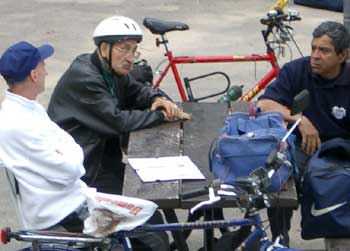
Conversation and scorekeeping during a softball game at the park
It's been years since we bought a house, and doing it in a foreign country, in a different language, is quite an experience. Yesterday we met with the real estate agent to go over the condominium co-ownership agreement and rules and most recent minutes - all of which are in French, with a lot of technical terms. Today I had to set an appointment for the closing with a notaire, the type of lawyer who handles property matters - that was also mostly in French.
In the afternoon we had a building inspection by a structural engineer. This is not required, but it's recommended for all property transactions. As it turned out, the inspector, Serge, was a great guy who hit it off with us immediately - possibly because he is an amateur but avid photographer who was very interested in J.'s digital camera. With him we had a complete tour of the building's exterior and interior, and in the process learned a great deal about Montreal's building regulations, techniques of construction, soil types and their effect on structures, potential problems caused by the extreme winters, security, and all sorts of regulations and costs - very different from back home - about electricity, water, sprinkler systems, fire codes, plumbing, venting, roofs...it was quite enlightening. Afterwards, on the street, we talked for close to another hour about politics and culture, gaining a number of restaurant recommendations and trading more camera talk.
Nearly all our interactions have been like this - professional, but very laid back, with plenty of time for informal, friendly chit-chat. The inspection was supposed to take one hour. It ended up being three, and we were charged for one.
The most surprising thing we learned was about security. Most buildings have alarm systems, but when we asked about the potential for break-ins Serge told us, "Because the Plateau is an affluent area, once in a while there will be a theft, but it's not common. Put a sign in your window 'prenez garde du chien' - beware of the dog. And you have an alarm system, and the police are right down the street. You'll be fine."
"Are they armed robberies?" I asked.
He looked totally shocked. "No!" he said. "People in Canada don't have guns. In fact, it's so rare that this winter when there was a hostage situation during an attempted theft at a convenience store in Westmount, it was all over the papers all across Canada. No, no, it's not like in the U.S." Clearly it's not: in our area, we see women biking or walking alone at all hours of the night, and they seem totally unconcerned about their safety.
Another significant event happened yesterday - we finally had a conversation with the owner of that favorite cafe of ours. In fact, he inititated it - he asked J. where he was from. J. told him we were American but that his parents were Syrian and Armenian. As you may remember we have thought the proprietor was Turkish. But, as it turned out, he is Iraqi.
J. brought my moussaka to the table and told me all of this while we ate; meanwhile, the proprietor sat down at one of the small marble cafe tables near two patrons who were playing chess, where he was joined by an elderly man, a retired McGill professor perhaps, who was also watching the intense game. Afterwards we took our dishes back to the counter, and I asked the first question I've addressed to him that wasn't about food: "Is your family all right?"
"Yes," he said. "They are in Baghdad. Right now most of the trouble seems to be in the south. But after June 30, maybe it will be better." He looked searchingly at us.
"We can all hope," I said. "Insh'allah."
"Insh'allah," he replied.
9:21 PM
|
Monday, May 24, 2004
Today, a week before departure, was the first day it hit me that we’re going home soon. I really have not thought much about my Other Life since we’ve been here; it’s been more like feeling successive layers of stress fall from my shoulders, like winter clothes, and seeing a new, lighter “me” emerge. I don’t want to go back to the way things felt before, and that is going to be the challenge.
However, things really can’t go back entirely: we have bought a small apartment – a condominium – in the Plateau Mont Royal, the section of town where we’ve been living. This was a big leap, and a major life decision for two people who have lived in the same house, in the same village, for the past thirty years. It’s a logical one for us, though, even as we go against the grain by choosing the city for balance, rather than the country. I am ecstatic, and still a little bit in shock that we actually did this. The closing won’t be until July or August, and we won’t be back up here until then. The other part of this decision will be a continued simplification of our life back home; I want to get rid of everything superfluous or un-needed, and to do everything we can to streamline our life there. One thing we’ve come to realize this month is how much the responsibility of owning an old, fairly large house weighs on us. If it’s not ice dams and the roof, it’s clay soil and drainage problems in the basement…the list is endless. It’s also clear to me that I need to re-assess all of my commitments, and to begin to say more “no”s.
Today we drove out to the outer part of the city to the local IKEA, and did some snooping around for furniture – didn’t buy anything, but had fun. Montreal has a population of 3 ½ million (I think) but a rather small downtown; the city is spread out horizontally across the flat floodplain of the St. Lawrence, and it’s only when you get out of the center that you realize how far it goes on. Out there it is a rather ugly sea of warehouses, low office buildings and manufacturing plants, with occasional malls and service areas criss-crossed by the big interstate highways. In the suburban areas the city is quite different; in spite of the French signs it feels more like any industrialized North American city where car-culture reigns. In the inner city, the feeling is entirely other, with the graceful wrought-iron balconies, lace-curtained doors, and residential streets of walk-up brick buildings, rarely more than three stories high.
Our new building, though, is modern; a bow we made to the need to be able to turn the key and leave without worries. It feels like the start of a new way of life to me; I’m still pinching myself.
8:34 PM
|
Sunday, May 23, 2004
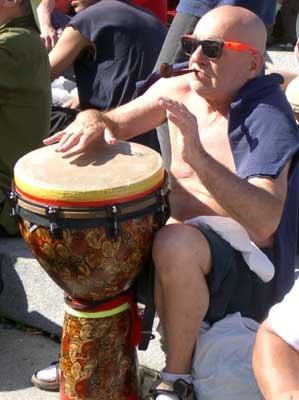
TAM-TAM
On summer Sundays, Parc Mont-Royal, the largest and most central of the big city parks, is taken over by thousands of Montrealers who come to be part of Tam-Tam, an African drumming -- umm, what would you call it? -- happening. Drummers of all ages and all personal styles come together with a relaxed, social crowd for an afternoon of drumming, dancing, talking, hacky-sack games, Frisbee-throwing, juggling, and just general lazing around. Sometimes all the drummers – literally hundreds of them – gather at the base of the big monument where, following an expert leader, they pick up a unison rhythm and pattern augmented by improvisation by experts and other instrumentalists who happen to come along. Each “beat” goes on, with elaborations, for ten or fifteen minutes, with a dancing crowd in front, and then changes to something different. All around the periphery of the monument, hippie vendors sell everything from Indian clothing to Nicaraguan hammocks and handmade jewelry, and beyond, on the grass and in the woods that cover the sides of the actual mountain that gave Montreal its name, a huge, good-natured party goes on.
After such a long and harsh winter, it’s easy to understand the joy with which Montrealers greet good weather, and the verve with which they enjoy it. Despite the size of the crowd, I’ve never seen any incidents; people look out for each other; there are old people there and lots of families with children; and alcohol is forbidden in the park (although you do smell another substance occasionally.) There are usually a few cops casually wandering through, and they do enforce the alcohol rule. Today we saw two of them stopping at one of the vendor’s stalls, flashing badges and holding out papers. At first, being Americans I guess, we immediately thought, “Oh, wow, they’re busting somebody.” Then, when we saw them move on to the next stall, we decided they were checking to see if the vendors had the requisite permits. Wrong again. They were going through the crowd holding a picture of a girl who was apparently missing, trying to find out if anyone had seen her. I hope they had some success.
Our visiting friends left around 7:30 pm, feeling, I think, as if they had had a whirlwind culinary, cultural, and leg-stretching tour of the city. Today we took them for a metro ride, toured Chinatown and had a dim sum lunch, then showed them the Place des Arts, the cultural center for classical concerts, dance, and contemporary art; walked up to Tam-Tam; and then came back to the little café I’ve written about before for a quick bite before heading back here on the metro. I’m happy to report that the proprietor of the café not only recognized us this time, but waved to us through the window the other day as we walked past. We still don’t know where he’s from, but it’s almost beginning to feel like we’re “regulars”.
11:24 PM
|
Our good friends and neighbors from home are visiting us, and yesterday we took them on a tour of the market and our favorite shops for food, came back here for wine and cheese and cherries with our neighbors and landlady, and then went out for Turkish food ("we want to eat something we've never eaten")in the late evening. Being very good sports, they wanted to try any famous local dishes, so we thought that was an occasion for leaping into the world of poutine.
For those who have never heard of it, poutine, Quebec's national dish, is a heart-stopping platter or bowl of french fries, covered with gravy and cheese curds. I had only tasted it once, years ago, in a little roadside cafe just across the border from Isle la Motte in Lake Champlain. Once was enough. Yesterday, though, we ordered a bowl and everyone ate some. The fries, from a place called Frites Alors! were perfect, the gravy tasty but, well, weird - who wants soggy French fries? - and the cheese curds just over-the-top in fat and caloric content. But, you know, that's on a warm nearly-summer day. Ask me again in February; poutine might be just the ticket.
11:59 AM
|
Saturday, May 22, 2004
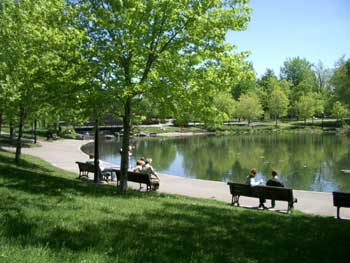
One of the lakes at Parc LaFontaine
Well, it's 11:30 on Saturday morning and finally people are beginning to stir. The world here runs on a different clock: nothing is open before 10, often 11, and shops stay open much later, often until 9 pm, when people go home and have dinner. We made an appointment to meet someone at their house and when they said, 'What time? and we suggested "10 am?" they said fine, but I caught the look of surprise - even shock - in their eyes that someone would even suggest such an uncivilized hour. Lesson learned. The Montreal Gazette carried a story yesterday saying that Montreal ranks at the very bottom among major North American cities in per capita productivity. That could very well be. On the other hand, people here certainly enjoy their lives. This contrast, between our ambition- and efficiency-driven normal existence at home, and the patterns of life we have observed and gradually fallen into here, has taught us the most this month.
I know I could never stop being productive and wanting to write well, for example. I like to work. But I also like and enjoy people. Here it seems that people segment their lives more, perhaps: they work, and then they're at home, and when they're at home, they enjoy themselves through the simple, gracious pleasures that life offers. I'm continually astounded at how much more relaxed people are here, and how much less stress and anxiety seems to enter into daily activity. We have had a little contest to count how many laptops we've seen being carried around the street: the current cumulative tally is three. Traffic moves at a reasonable pace, with little yelling or honking. People walk or ride bicycles, and they don't seem in a particular hurry. In all our time here, I have never seen a parent yelling at a child or yanking them around - not once. Watching G. with her little daughter, it is absolutely clear to me how secure and happy the child is, but also how unlikely it is that, as an adolescent, she'll be "scheduled" every minute of her day. It is much more the way I grew up, fifty years ago, and from a 21st century perspective it seems very old-fashioned - but I think that is part of the attraction. People here have simply said "no" about some major life decisions, and "yes" to others - such as dropping in on one's neighbors for a glass of wine or a conversation, or eating chocolate and cream occasionally, and guiltlessly. At the bakery the other day, I watched as an elderly woman ordered her baguette and a beautiful little blueberry tartlette, just for herself. And the other night, walking back up our street, we passed an older man sitting in a chair on his front steps, all alone, with a glass of red wine which he lifted toward us in greeting. All I can say is, this doesn't happen in my village!
Last night, around 8 pm, G. came up our stairs with Marie to ask if we needed anything at the boulangerie or the epicier (grocery). Diane came out too, and we all said, "No, let's all go together!" So off we went, down the street, as an entourage led by Marie pushing her own stroller. First we went to the bakery where G. works on Sundays. We entered, and the man behind the specialty saucisse (sausage) counter said, "Bonsoir, Marie!" Then the baker said, "Oh who are your friends?" and entered into a long conversation with all of us, holding out a handful of pieces of cake for us to try, as if we were a flock of hungry birds. Meanwhile, another baker was cleaning sunflower seeds out of the glass display case, below, and playing peek-a-boo with Marie all the while. Form there we went to the coffee store to buy coffee for J.; again, everyone knew G. and Marie, and both the proprietaries were delighted to have one of those half French/half English wide-ranging conversations with us as we discussed which coffee to buy, and the merits of the different shiny espresso pots lined up on the shelf above the coffee bins. That shop specializes in coffees, teas, oils, confitures (jams), and chocolates. Diane bought a bar of dark chocolate for all of us to share, at G.'s recommendation: "This one is the best! And," she said, rolling her eyes and raising her eyebrows, "It's good for you - c'est biologique!" (organic)
Then we went to meet the butcher at the shop on the corner - excellent meats, a few cheeses, and entrees that had been prepared that day - served by three delightful men in white coats and little round hats who also knew our hosts intimately and had a little gift of chocolate for Marie. "C'est le monde de Marie," we said, and G. agreed. (None of this, I might add, was any more expensive than back home; it is just a totally different way of acquiring one's food.)
Finally, back to the epicier for mushrooms, and then the walk back up the block to the house, the stroller loaded with bread and groceries, where we all sat on the sidewalk and ate chocolate and drank Quebec-grown grape-apple juice, and talked until a tiny moon appeared in the sky and it was time to say bon soiree.
11:44 AM
|
Thursday, May 20, 2004
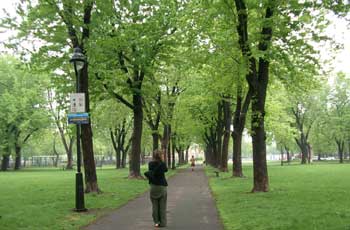
RAINY DAY IN A NEARBY PARK
A few of you sound like you’ve been worried about my absence from these pages – thank you - that’s what I get for being predictable! No problem – our health is fine now. We’ve been looking at apartments, though, and this has consumed a lot of our time and energy. I’ll write more on that eventually. Also, I heard that there may have been a problem getting this blog to load. Please let me know if you've been having trouble (other than having to wait for pictures).
Spring is in full bloom here, and it is truly beautiful. In the parks, the flowering trees are magnificent, and everywhere in the little residential gardens along the streets there are tulips, bleeding hearts, lilac trees. It’s lovely, especially for those of us who know what Montreal is like in deep winter. The climate here is actually warmer than back home, and certain plants, like some roses and species of trees, thrive here that cannot be grown where I live normally. It’s always a surprise to see large rose bushes in gardens; most of mine die back close to the ground each year. My good friend has been taking care of my garden and plants at home, and today she called and said, “You have a lot of flowers but also a lot of weeds.” I’m sure it’s true.
Today I drove by myself to the big open air market and did the shopping, and it was glorious. Cherries and nectarines, baskets of little fresh carrots, and pots of tender herbs have joined the peaches and strawberries of last week. There were large plants of tomatoes, eggplant, lettuces of every variety, peppers and melons…but with the variety and quality of produce one can buy, the only reasons I can see for gardening here are to guarantee an organic crop, and for pure pleasure. I do miss my own garden, and when I think of “home” that’s what comes first to mind these days, along with my friends who I haven’t seen now for a long time. As our last week here draws nearer, I do find myself thinking of home more often, and beginning to make the mental transition. It will be good to be back in our own bed, and to have a regular stove instead of a single hot plate!
We are marveling at the subtle ways in which people here are different. J. was at the bank today, and the officer he was speaking to came originally from Bangladesh. She was extremely helpful and kind, and when they had finished their business, she initiated a long conversation on quite a personal level, just for the sake of being friendly, telling him about her own story and asking about ours. We have had innumerable encounters like this, where a “business” or routine transaction turned into a much longer conversation, full of curiosity and friendliness on both sides. People go slower. None of the businesses we’ve dealt with have voice mail. It seems to us that people are quite relaxed with one another, and that there is more innate trust and considerably less fear and caution than we’re used to – although of course, we come from New England, one of the most reserved parts of the United States. But we have been quite surprised when, for example, our landlady asked us if we could watch her daughter while she did an errand or some work; we don’t know each other that well, but people live in close proximity and there seems to be a lot of this sort of give-and-take and relaxed helpfulness and neighborliness. It’s nice.
My French is improving rapidly, although I can see now how far I’d have to go before attaining anything resembling true fluency. I am speaking French whenever I can, and the more practice I have, the better it gets. Today I had a long conversation with someone who didn’t speak much English at all, and it was fun to feel my brain cranking really hard to find the right words, the right tenses and genders, and a way to express complex thoughts with the vocabulary that I do possess. It is possible, though, and reminds me of painting with a limited palette – sometimes the result is actually better, and more distilled, for having constraints. (I’m glad I don’t have to write my blog that way, though!)
Talking to little Marie is the greatest challenge. She is sure I can understand her, and when I can’t, she repeats the phrase perhaps five or six times, fixes me with an intense, quizzical gaze, and says “Eh? Eh?” I know when I hear that “Eh?” that I’m really in trouble. But it’s getting better; I don’t feel like a total idiot anymore, and she doesn’t have to resort quite so often to theater.
At noon we were eating in a little Thai take-out restaurant a few blocks away, when someone said, “Oh! So you’ve discovered our neighborhood secrets.” It was Leather Man, in a different Hawaiian shirt, and we had another good conversation before he hopped on his bicycle with his spring rolls and rice to pedal back to his shop.
11:02 PM
|
Monday, May 17, 2004
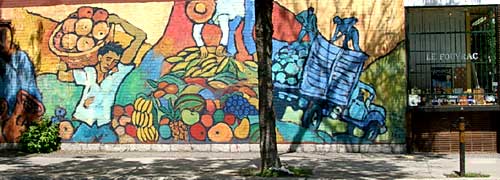
There are small-scale murals all over this neighborhood, and I’ve started to get interested in them. After a lunch of Asian noodles, I had stopped at a streetcorner to take a picture of this one, which is one of the more artistic and serious, and then continued walking past a man in a Hawaiian shirt who was digging at the small plot of earth around his street tree nearby. He’d shot a few glances at me while I was taking the pictures, and when we went past, he said ‘Bonjour” and then, when we replied, he said, in French, “I’ve taken hundreds of pictures of murals.” I stopped. “In Montreal?” I asked. “Some yes, but mostly in San Francisco.” “Oh, really,” I said, switching to English. He answered in English that sounded pretty American. “Yes…I can show you if you like. Do you have a minute?” We said sure, and he propped his shovel against the side of the building and headed into the leather shop on the corner. “Come on,” he said, gesturing with one arm.
He led us into his “office”, a backroom behind the trendy leather shop filled with one-of-a-kind shoes, sandals, slippers, boots and purses. There were hides of all sorts of animals and reptiles on the high-ceilinged walls, and a great many books, a Chinese tapestry, posters from Montreal music events, some Renaissance etchings, a print of a painting of Salome with St. John the Baptist’s head on the platter, a carved wooden candle stand, more books, a tape player, two low chairs covered in brown velveteen; it was all dusty and unkempt and looked like favorite stuff he had hauled around and had in every shop he’d ever run. An adjacent room – dark - held an old metal Singer and was clearly the place where the leatherwork was done. He got out a folder of color photographs, many taped together to form long panoramas, and proceeded to tell us about each one: it was an incredible tour of the work of mostly-Latino muralists in San Francisco. This man had made a project of photographing them as part of documenting the neighborhoods wherever he’s lived; I was stunned by some of what he showed us. He turned out to be an American who’s been in Montreal for four years (“How did I end up here? C’est un cas d’une femme.”)
A couple of hours later we walked out of the shop, a little dazed, knowing a good deal more about this particular neighborhood of Montreal than we had, a lot more about San Francisco, and a much better sense of the comparison between the two cities. All because I took this picture, I guess, on a good day for gardening.
4:22 PM
|
Sunday, May 16, 2004
This morning we had a celebratory breakfast: J. has graduated to soft foods so he was able to eat French toast with buzzed strawberries on top! Fantastic! And for lunch, soup, and a tuna fish sandwich on soft bread – I think I got as much pleasure out of watching him eat as he did out of eating.
After breakfast we decided to go to church, and chose an Anglican parish whose website had resonated with us; they are very mission-oriented, described themselves as ethnically diverse, and have sponsored numerous refugee families over the years. The parish is called The Church of the Advent, and like many of the Anglican churches, it’s located in Westmount. So we left our French neighborhood at 9:30, got on the metro, changed to the green line at Berri/UQAM (that’s “University of Quebec at Montreal”) and headed west. About twenty-five minutes later we emerged into the very different world of Westmount, with its large lawns, flowering crabapples, sleek office buildings and residential towers. The Church of the Advent is located on a quiet street; we were a little late by the time we found it and tried to open the door quietly. Nevertheless, when we entered, just as the sermon was about to start, thirty heads turned round to see who had come in. And those thirty - grey- and brown-haired Caucasians, black women in African dress, Asians, Latin Americans – made up the entire congregation.
As we settled into a back pew and were handed hymnals and an order of service, the lilting, West-Indian voice of the rector began the sermon with the words, “By now, most of you have probably made a decision about where you will go when this church closes.” We were stunned; this wasn’t what we had expected, but as the sermon progressed it became clear that after a number of years of struggle and soul-searching, the congregation had decided to sell their buildings, which they could no longer support, and join another congregation. We found out more later. But we sat and listened to the sermon, which was about openness to learning about faith, even when we are old, and then at the Peace, we were greeted with smiles and warm handshakes by every single person in the sanctuary and by the rector, deacon, and acolyte - a tall adult man. At that point we moved up to sit further forward.
The service was fairly High Anglican, with Sanctus bells, but it was also extremely warm and relaxed. Four children, in the pew ahead of us, sprawled on their parents and quietly played with each other. People came and went, and came back in. Communion was given at the altar rail, kneeling, and there was no question of dipping one’s wafer in the wine; everybody drank from the chalice, carefully wiped each time by the deacon. After the service concluded, there were announcements, and an invitation to the coffee hour, and the clergy walked out in procession during the last hymn, with – to our astonishment – one little girl going up and clinging to the bottom of the processional cross while the acolyte, completely nonplussed, carried it out.
Of course we stayed for the coffee hour, which stretched past an hour, and had a fascinating discussion with the deacon – an American citizen who said he had “Landed Canadian Immigrant” status but had been ordained in California, moved to Canada thirty years ago, and “through inertia” had never left. It turned out that he was a medieval historian, by profession, and had written his dissertation, at Oxford, on the history of the medieval diaconate.
We also talked to the fellow in charge of the transition committee, who told us that they had visited and talked with all the Anglican parishes and only found one who was really sympathetic to their mission focus and willing to absorb both the parishioners and keep the mission going. “You Americans really got us going on that,” he said, his eyes twinkling. “The very first family of boat people to come to Canada, during Vietnam, came right here, to this parish, and we have helped refugee families ever since. Oh yes, we’ve supported them emotionally, physically – some have lived right here – we’ve gone to battle for them legally. It’s what we do.” Later one of the women, with a broad smile and a bright Latin American warmth, told me that the reason the decision to close had taken so long was that they were helping two Peruvian families, with fifteen children between them, and that everyone felt so responsible for them that they couldn’t bring themselves to close the church. Finally the families (I think one of them had been the family in the pew in front of us) had gotten stable enough to manage on their own, and the decision had been made to join with St. George’s parish, a much more affluent and larger congregation in the same area of the city. “Look for us there when you come back,” they said. ‘We’d love to have you worship with us.”
There was quite a bit of interest that we were from the infamous Diocese of New Hampshire and knew Gene Robinson, but the same fellow said, “Actually, this is all a much bigger deal to you in the States than it is to us up here. We’re really quite fine with it up here; somehow Canada doesn’t seem to have inherited the same puritanical streak when it comes to matters of sexuality.”
As we were talking, we heard chanting from the church; I thought it was a rehearsal for something, but when it came time to leave, we had to sneak out through another, ongoing church service – this time a much fuller congregation of Rumanian Orthodox. “They’d like to buy the building but probably can’t afford it,” the deacon told us. “In any case, we’ve been told we can keep our endowment, but the Diocese of Montreal owns the property, so they’ll sell it to the highest bidder – trying to keep it as a house of worship, one would hope.”
All the mainstream churches in Canada are struggling with declining memberships, apparently, and in Quebec the Anglos and Catholics often face off with their buildings as well. “Look downtown, on Sherbrooke,” the deacon told us. “There’s an Anglo-Catholic Church, and a Roman Catholic Church facing each other across the street. The French go to the Roman Catholic Church, and the Irish go to the Anglo-Catholic one, and they hate each other. But the Irish actually believe; a lot of the French hate the church.” We’ve heard quite a bit of that criticism here; our landlady told us, “Les eglises sont tres riches, mais ils sont vides.” (The churches are rich, but they’re empty.) “Still,” she said, “they don’t stop asking us for money. I went to Catholic school, I know about the Church – and I don’t want anything to do with it.”
But Anglicans are still the foreigners in Montreal. “We have a saying,” the deacon told us, as we parted. “There are three places a Montreal Anglican can go. To heaven, to hell, or to Toronto.”
9:36 PM
|
Saturday, May 15, 2004
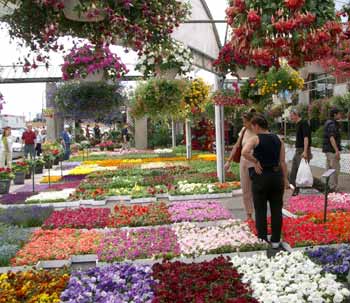
It’s hard to believe we’ve been here two weeks already, and that the month is half gone! Today was a little rainy but warm; we lazed around in the morning, grateful that both of us are feeling better, and then in the early afternoon went to the new Marche Centrale. Eventually, we think, this area will house a large fruit and vegetable market but for now all we found were flowers – but what flowers! Large open air stalls stretching on and on, from one grower to another, filled with annuals, perennials, vegetables, houseplants. It’s a good thing I don’t have a garden to fill. After that we went back to our usual produce shopping at the Jean Talon market, where in addition to strawberries we found luscious, ripe peaches today.
I forgot to tell a story from yesterday. In the late morning there was a knock at the door – it was our landlady, G. “I’ve found something good,” she said. “But…” slightly apologetic, pleading look, “it requires votre voiture” (your car). “Ok,” J. said, “let’s go.” I said I’d watch Marie, and the two of them took off in the car. When they returned, thirty minutes later, they were carrying a big, comfortable chair upholstered in green imitation leather, with one big tear in the seat. “For the terrace”, G. said, beaming. Later J. told me when they had arrived at the point where she said she had seen the chair on the sidewalk, nothing was there. “Oh, don't worry,” she said, jumping out of the car and running over to the side of a nearby building, and triumphantly pulling out the chair from where she had hidden it beneath the fire escape.
Tonight G. and our neighbor have gone to supper at a friend’s. To go there, G. picked up a little car form CommunAuto, a car rental service that seems wonderfully practical – does anyone know of a service like this in other cities? You pay a yearly or monthly membership fee, make a reservation over the internet when you want to use a car, and pick it up from one of many, many parking lots located all over the city. For those who don’t want to maintain a car here, it seems like a very efficient solution.
Many people also ride bikes. Last night J. went for a long ride. There are beautiful bike paths throughout the city, connecting all the parks. He rode for three hours, through various neighborhoods, past the huge soccer stadium, past community gardens and local basketball games, all the way to the river that forms the northern border of the island, La Riviere des Prairies (the St. Lawrence is below it.) He came back wet, muddy, and happy.
8:23 PM
|
Friday, May 14, 2004
It’s raining: a thunderstorm that’s been gathering for the last few hours. J. is off on an adventure on our neighbor’s bicycle, and I’ve just come in from a marathon drawing session with Marie. Her favorite things to draw are monsters and dinosaurs, which she accompanies with a noisy soundtrack. I drew her a fly (mouche) and an ant (fourmi); she happily walks around the back porch now naming all the various creatures depicted in chalk.
I woke up feeling horrible, went back to sleep, and woke up again at about 9:30. J. read me the comments some of you had left here, and I was so touched that I cried. They also made me feel much better, and as the day has gone on, I’ve definitely improved, feeling almost normal by late afternoon. A sore throat, still, and a stuffy head, but the body aches are gone, thank God.
My mother, on the telephone, said “It’s hard to be sick away from home,” but I said, “Oh, no, this is fine, it feels like home” – and it does. Strange. But this sojourn is teaching me a lot about what makes home home. I think, actually, that the definition has changed quite a bit for me over time, mutating from a collection of external places and objects and possible activities to something that I carry with me.
The last time I was ill away from home we were in a hotel room in London. I had gotten violently sick on some Chinese pork, and was up all night long, and into the next morning, when a doctor-friend who we had met gave me his last packet of Smecta, a suspected opiate he’d been prescribed when the same thing happened to him in Lithuania. It worked immediately, and in a few hours I had recovered completely; to this day I have a special feeling of gratitude for that spontaneous generosity. Here there hasn’t been a quick cure, but there have been other kind strangers, and the ongoing pleasure of birds eating below someone else’s trees, squirrels traversing someone else’s wires, leaves unfurling and magnolias and tulips blooming. And most of all, my beloved is here with me.
We think of “home” so much as “place”, the most poignant and particular of all, but I am beginning to see it more as a state of mind. Certainly there are places where we “fit” and places that are too alien or too jarring to us to ever feel comfortable. But if I am not home in myself, I’ll never feel at home anywhere, and if I do feel at home in myself, anywhere I am will be home, and will have the possibility of becoming a hospitable place for others. It’s one more example, it seems, of a search that leads back to the source.
8:43 PM
|
Thursday, May 13, 2004
Yesterday evening I went down with a slight fever. The infirmary is full. In the dormitory, there is a lot of noise, to which I contribute my unsuccessful efforts to breathe.
The terrible thing about sickness is that you tend to think you are sick. Your thoughts are narrowed down to your own little rag of a body. And you take care of her. My God, forgive me, I take care of myself too well to be a good Cisterian…
…This is a most peculiar disease. It pretends to leave you, but it only pretends. Actually it is only drawing back to take a good spring at you and claw you all over again…
This afternoon I finally stayed in bed for good. Why should it be a penance to stay in bed? I scarcely know. It is quiet, and pleasant, and you can pray. And yet it almost takes ropes to keep me there. For instance, I am not there now…
Thomas Merton, The Sign of Jonas, March 25-28, 1950
Today I gave up and didn’t go out at all, except to draw some pictures with fat chalk on the deck outside, where the little girl had been drawing. I wanted to surprise her, so tomorrow, if it doesn’t rain, she’ll find a robin pulling a worm, some fish in a pond, and a flower. She had drawn a long pink creature with spines, that her mother labeled “Dragon”, presumably for our benefit.
J. is mending, and I am languishing, but I thought maybe if I could manage to lay low I’d get better faster. This, too, is a peculiar bug – neither a straightforward cold nor the flu, but something in-between, with cold-like symptoms added to body and joint aches. Today my head felt like it was exploding, but now I’m better, and hoping the thing isn’t just “drawing back” to take another claw at me in the morning.
Considering the state of things in both the larger and the individual worlds, I shouldn’t be as calm as I’ve been ever since arriving here, and yet, that is how I’ve felt. The other night I was lying propped up in bed; J. had already gone to sleep. With my near-sighted eyes I looked across the room at the rather blurry yellow curtain. The lights of the apartments across the street illuminated the fabric, and the window frames and partly-open French shutters made a shadow-pattern on it. Against the deep darkness of the room, this was very pleasing, and I looked at it for a long time, listening to my husband’s breathing and to the silence, suspended in a state of non-thinking. What it was, was acceptance of the moment just as it was; of myself as I was; the place as it was; my body as it was; and time as an illusion. It’s been a long time since my mind was able to settle down that much, and I was grateful for it.
9:10 PM
|
Very slow this morning, after a restless night. Our apartment is turning into a hospital ship: J. has a mouthful of sutures, some of which seem to be pulling out, and I have a cold/flu that is causing a stuffy head, sore throat, and persistent body aches. It’s better today, but still fighting for the upper hand. I’ve invited it quite plainly to leave.
Outside – a beautiful day. The leaves are almost fully out now; light green and fresh as lettuce. We found out yesterday that the “horticulture” trucks come by twice a year to trim the street trees. “They cut quite a lot,” I said to our landlady. “Trop!” she said, raising her eyebrows. “Too much!” Today another truck came through, watering all the trees.
So the news is full of more horrible pictures and revelations from Iraq. What gets me are the comments from America: “I don’t know how these people got into our military,” – this from a Congressman; and the inevitable “she seemed like such a nice girl” from the hometown folks. What the hell is the matter with these people? Are they blind? Or just moronic? We have a culture that glorifies violence and makes it available to our children, in all its perverse forms. The culture sends incredibly mixed messages about sex and sexuality, and yet, through its Puritanism, has never found a way to teach young people what constitutes healthy sexuality or healthy relationships. And we glorify “freedom” and “democracy” and “America” and send children off to fight in a culture they know nothing about, but which has been reduced to vilified stereotypes, put them into frightening and demanding situations for which they’ve had no training, and then expect them to know how to handle it – and are horrified when suddenly we’re forced to witness the pairing of sexuality and violence.
Frankly, I’m disgusted but not shocked by what I’ve seen and read so far, because I know that human beings are capable of unimaginable behavior, particularly during war. All you have to do is read history to know that. I know that power and sexuality and violence are a very volatile mix. What angers me the most is the righteous indignation among Americans at every level, and their apparent inability to understand the laws of cause and effect. And it also makes me crazy to come up again and again against this naivete: as if we are somehow morally superior to all other societies, and immune to deviant behavior. Who is kidding who? When are those puritanical scales going to fall from our eyes?
Here in Montreal, there is a sex industry, and it is far more out in the open than what we’re used to in America. I don’t know a great deal about how it works, or what the State’s involvement is, but there are sex clubs and sexual services intermixed with retail businesses on St. Catherine Street and in other places, and when you open any of the “what’s on” arts newspapers, there are ads in the back for just about anything a person might want, accompanied by nude pictures of beautiful young women with strategically-placed “stars”. This makes me sad – if I had a daughter I sure wouldn’t want to see her in those pages – but it doesn’t offend me, because I know that sex is a human need, and the idea that we can stop people from trying to get it, or sell it, is hopelessly naïve: again, look at history. And I also think honesty about human behavior is preferable to living in a bubble.
9:43 AM
|
Tuesday, May 11, 2004
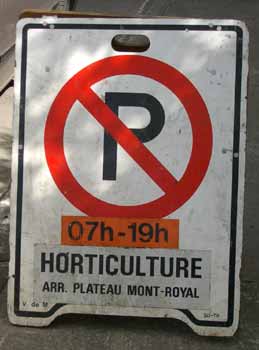
A day of lying low. J. has a swollen jaw but not much pain, and hasn’t complained, even about the thin, room-temperature chicken soup. His reward was a chocolate milk shake in the middle of the afternoon. I feel crummy but, all things considered, I’m not going to complain either – I didn’t have my jaw hammered, sawn and drilled, or whatever they did to him.
So it was a day of watching out the window, mostly; working on the computer, reading. Around noon we noticed “No Parking” signs – sandwich-board style – being put on the other side of the street. When we looked more closely, they read “Horticulture”. Hmm. Then a big City of Montreal truck with a lift and bucket came down our side; it was two men trimming the street trees. They carefully did their work, left the branches on the street for the garbage collectors tonight, and went on down the street. We’re amazed at what people leave out for the municipal garbage: mattresses, logs, rocks, chairs, lamps – today I even saw a bureau. Much of this gets set out a day before, and picked over by neighbors; it seems to be a system. Our landlady said a lot of the furniture in our apartment came from the street.
She got two deliveries: a pile of topsoil which was dumped against “garage” – a door leading to an unfinished space just big enough for a car, and a pile of rolled turf for a new lawn in her back garden. The latter came this morning and we worried all day that it would dry out before she got home, but with the help of friends, she got it laid before dinnertime while her daughter played in the mud with a toy wheelbarrow.
9:10 PM
|
Monday, May 10, 2004
J.’s surgery took a little more than four hours and was tricky, but successful. He’s home, icepacks on both cheeks, beginning the recuperative process. When I went to pick him up, the doctor came out to greet me and give J. some final instructions, very polite, “Bonjour, Madame.” He has a round face and big, dark Eastern European eyes. “Try not to smile too much,” he said, and added apologetically, “and no red wine.”
I had my own adventures today: it was my first time driving alone in the city, and that was exciting. But it was nothing like New York, or Boston, or LA – people here are so polite and the pace is really pretty sedate; the main deviation from orderly traffic is the swerving to avoid potholes, which are an inevitability in this climate.
The other new experience was purchasing prescriptions at the local pharmacy. Like most things here, there is a “way” it’s done. In this case, you give the prescription in at one window, even though there were no other clients waiting, and pick it up at another. The pharmacist, a young woman, was extremely attentive as she filled out a file for my husband, and then told me I could wait and it would be ready in “five to seven minutes” – which it was. When I picked up the prescriptions, which had been placed in a small plastic bin, she first asked what other medications he was taking and checked each new drug against that one in the computer. Satisfied that there weren’t any adverse interactions, she then spent a long time going over each of the prescribed medications in detail; this “conseil”, or “advice” is apparently a major part of the pharmacist’s job, but this was more thorough and more attentive than I’ve ever received. While waiting, I browsed around the store; there are a lot more homeopathic and herbal remedies here, as well as the usual shampoos and deodorants, and over-the-counter medications. Make-up and skin care are also bigger and more extensive, with a number of different lines, even in a small local pharmacy, and many products for applying and taking off one’s cosmetics.
One of the most fascinating aspects of living in a different culture is trying to figure out things that are confusing and unexpected. The other night, as we were leaving the apartment, a square-shaped, orange-colored van came around the far corner of the block, ringing a bell. We looked at each other in astonishment – could it be a Good Humor truck, caught in some sort of time-warp from our childhoods? The sound was absolutely identical. But when it got close, we saw the hand-painted script on the door: “Aiguisage” – “Sharpening”. It was a sharpening service, which must visit the neighborhood periodically. “Just like Damascus,” said J., amazed.
Last night he called me over to the window around dinnertime: “There’s a cock outside,” he said, and sure enough, there was a small car with a cheerful-looking, lighted rooster on the roof and a sign “Au Coq”. We figured that it was take-out food delivery, but of what? Omelettes? Only the yellow pages yielded an answer: not even fried chicken, but rotisserie chicken from “Au Coq Roulant” (“Chicken on Wheels”, basically) billed as “le meilleur poulet” in Montreal.
People put out bread for the birds, and someone even leaves a saucer of cat food outside her door for a neighborhood cat – maybe the striped tabby that suddenly appeared in our apartment last night, having somehow gotten into the back garden and climbed up the stairs to the second floor.
I’ve come down with a cold, which I hope, hope, hope will stay small and not communicate itself to my husband, since he is supposed to avoid sneezing and coughing, as well as red wine, food, and smiling. The weather has been crazy: 80 degrees again yesterday, cold and rainy today. All of our friends back home as well as many people here have colds, so it’s no wonder but unexpected and annoying, all the same.
9:37 PM
|
Sunday, May 09, 2004
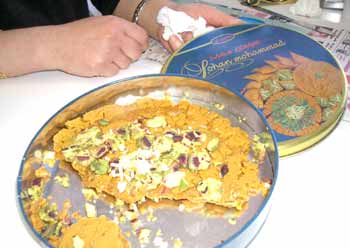
Last night some of our friends from home came to visit – Shirin and her husband, her father-in-law, and his friend. Shirin loves Montreal because there is so much wonderful Middle Eastern and Persian food, and her husband was teasing her that they had made one stop after another just to pick up different food items for her. At our apartment, after dinner, we sat around and ate fruit: apricots, strawberries, and oranges and gave Shirin two sweet lemons that we’d bought at the market. I’d never had one before, but she peeled the slightly lumpy fruit that looks like a small orange-sized lime, salted the segments, and gave them to each of us. It is a strange taste – sour but sweet, and not very lemony but definitely citrus. Shirin says in Iran they are considered medicinal, particularly good for people who have colds.
Today we met them for lunch at an Iranian kebab place in the section of Montreal called NDG. It took me a long time before I learned that NDG stands for Notre-Dame-de-Grace. To get there, you drive west through the downtown city-center and then through Westmount, the ultra-Anglo area of Montreal. There has been animosity between the Anglo and French citizens of Montreal forever, and both groups have created “zones” which are particularly theirs. The city is divided east-west by a main street called St. Laurent. East of it, and essentially east of the “mountain” (Mont-Royal) itself, the city is French. To the west, it is Anglo. The most French section is the Plateau Mont-Royal, where we are living, typified by residential neighborhoods of lace-curtained, wrought-iron balconied two-and three-story attached buildings and French-speaking shops. The most English area is Westmount, which looks like an English boarding school – spacious lawns, Gothic architecture, a conservatory and even a bowling green prominently placed close to the main street. Signage in Quebec must be in French, so in Westmount everything is in two languages: “Books” and “Livres”, which must irk the ultra-Anglos no end.
But beyond Westmount is NDG, with a lot of ethnic color. We met our friends at Marche Norooz, run by an Iranian family where the kebabs of spiced meat are grilled to perfection and served on warm pita with grilled onion and tomato and fresh herbs, and there is a bottomless pot of self-serve tea. Some of us drank dukkh, a sour, fizzy yogurt drink that I can’t stand but many Middle Easterners love. After lunch we ate most of a tin of a sweet that is a specialty from the holy city of Qom; it’s a not-very-sweet confection, less crunchy than peanut brittle and more so than halvah, flavored with saffron and pistachios.
My French triumphs and defeats for the day? Asking for salt in the supermarket and having the entire conversation in French without the stockboy switching into English. Listening nearly blankly to a fifteen-minute monologue by our landlady’s three-year old daughter, whose rapid-fire French became more and more earnest as she gradually realized these big dumb adults weren’t responding according to plan. I understood, finally, that she was telling a story about the neighbor’s dog, when she held her hands in front of my face, made a fearsome grimace, and said “GRRRR!”
Tomorrow J. is having his dental surgery in the afternoon, and then, after a few days of ice-packs and painkillers, we hope to be on the road to recovery.
9:25 PM
|
Saturday, May 08, 2004
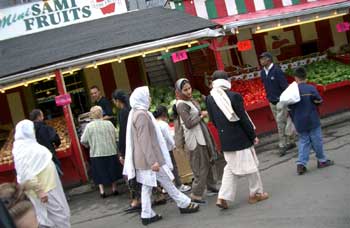
MARKET DAY
Today, Saturday, we took our neighbor and went to Marche Jean Talon, where we like to shop, and which is pretty close to where we're living. Our neighbor works for Air Canada and is here form Calgary, spending four months in an immersion French program for her job. She is trying to speak only French, so that's good for us, and we did our best to continue that during our morning at the market. We began at Patisserie Moisson, bakers extraordinaire, who have a shop with breads, pastries, pates and gourmet items on the side of the produce market. We bought three fresh butter croissants, one piece of chocolate mousse cake to share (such restraint!), and three coffees, and sat at a little green marble-top table eating and talking happily for an hour. (At one point I looked up and realized that the two French guys at a neighboring table had been listening to our halting but sincere conversation, and were quite amused.) We spoke about how lovely the women look here - the French women have so much style, regardless of income, and are so effortlessly feminine. How I wish! Our neighbor, who comes from a family of cattle breeders in Calgary, seems like a Canadian version of a western American, and finds Montrealers as different, appealing, and enigmatic as we do; it's fun to compare our impressions.
The market today was bursting with color - the first vegetable, herb and flower plants are being offered for sale, along with all the produce imaginable. We bought strawberries, oranges, asparagus, tomatoes and beautiful fresh basil, tiny zucchini and red peppers, lettuce and cucumbers, and just-blushing pears, and barely resisted the grilled sausages and spice-encrusted chicken at the Moroccan shop where we puchased raisins.
J. is having fairly extensive dental surgery on Monday afternoon, so some of this food will be wishful thinking for a while, or made into purees. In spite of that - a kind of torture in this culinary Mecca - we are settling into a pleasant routine of morning work and afternoon prowling, and spend most evenings at home reading or writing. The close quarters don't seem to be a problem for us at all, perhaps because we have imposed a "no talking" rule during work time. I'm making gradual progress on the book - slower than I'd like, but I'm accepting it as the pace that nature intends for me at the moment.
3:10 PM
|
Thursday, May 06, 2004
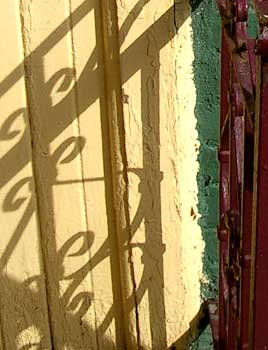
Slowly, slowly, I can feel myself quieting down and entering the pace of this life and this neighborhood. Today was a lovely day that warmed gradually, with large white clouds and a sun that shyly emerged and retreated. In the morning I made French toast which we ate with pears and coffee, then I took a bath and did the laundry before settling down to work. There is a clever drying rack on the back balcony; four “legs” fold out from a central support, and coated wire-rack shelves flip up to lock onto the outer edged of the supports. You can either hang clothes from the wires with clothespins (pince a ligne) or lay them flat. I washed our things by hand in the sink, wrung them out, and carried them outside, where I took up each one and hung it to dry. I think that was when the sense of contentment began to come over me, but it is always present here, too, in the kitchen.
Our life is very simple, so much simpler than at home, and already I find myself, as I expected, questioning why and how regular life has become so complicated. Here we have a little wooden table, two old wooden chairs, four plates, four glasses, two coffee cups, four sets of silverware, a bowl, two pots and one sauté pan, a hot plate, a toaster-oven, a French-press coffee maker and a microwave. That’s it! You shop every day, and the produce, fish, and meat are extremely fresh. I bought eggs at the market from a farmer who had come in from the countryside; they are brown and have deep yellow yolks, and are delicious. I can feel the simple pleasure, sitting here at the small wooden table, of looking over at three perfect tomatoes, a bottle of wine for dinner, the tile floor, the yellow curtain at the window and the balconies of the apartments across the street. This afternoon, when I returned from a walk around the neighboring residential streets, I made myself a cup of sweet Arab coffee and sat drinking it on the top step outside. Little sparrows played in the tree, dropping down every now and then to pick up some bread crumbs. A young couple went by with their baby in a carriage. The old Frenchman with the craggy face who lives down the street passed by with his shaggy lapdog on a leash, two blue bows in her hair, and smiled up at me.
Later I went out to buy a bottle of wine for dinner. We’re beginning to do our usual reconnaissance of the neighborhood: where is the post office, the bank, the favorite café, the used-book store, the dry cleaner; which is the most interesting way to the metro; who goes to the park and what do they do there? What can you put in the grass-green recycling bins for the truck that come on Wednesdays? How do people manage their cars for the street-cleaning on Mondays and Thursdays? I watched as mothers picked up their children from the local elementary school, pulling the boys away from their soccer games in the paved, fenced playground, and bending down to talk to the little girls, arm around a shoulder, to hear how the day went. Lots of people ride bicycles, but there’s little overt exercise, American-style - except for the occasional skin-tight-jerseyed cyclist who looks as if he's about to enter the Tour de France - and almost no bottle-toting or high-tech fitness clothing. The neighborhood feeling is congenial, and entremely laid-back. And at five pm, there’s nearly always a big black standard poodle tethered outside the local market. He looks up eagerly when you say, “Bonjour!”
6:50 PM
|
Tuesday, May 04, 2004
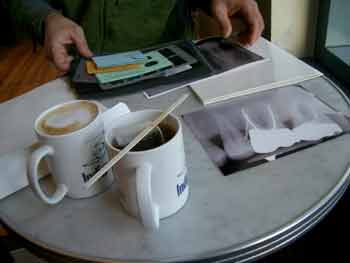
Today J. and I went to meet the dentist and have a consultation. I waited in the reception area, and when I heard him laughing I knew he was happy for the first time in this sorry dental saga. We went for coffee afterwards and he told me the dentist, who is Romanian, knew exactly what he was looking at as soon as J. gave him the x-rays, and had explained everything in great detail and made a firm recommendation of what he would like to do for the restoration of the three teeth in question. It was a very professional clinic, and interesting to me to see how the office ran and what the patients were like – although, of course, most of the conversation was in French. Everyone who came in seemed calm – that was a good sign – and the staff was both professional and friendly, all attired in starched white medical garb.
We’ve been coming to Montreal since the mid-90s, but much more frequently in the last three years. It’s not a beautiful city, not at all; the interest and beauty have more to do with the people and the mix of cultures. Observations from today:
-Everybody reads. A fancy, scrolling digital sign on the metro car we were gave, among other notices, recommendations by Montreal librarians of good new books.
-My winter sloth is rapidly receding; with a goal of walking four miles a day, I am already getting into better shape.
-A feature film is being shot in the local park, complete with huge carbon-arc lights, Panavision camera on rails, cranes for overhead shots, and 50’s vintage cars and costumes. It was fascinating to watch.
-People here are thinner and seem to eat less, especially less meat and processed food, but what they eat is very high quality – especially the fruits and vegetables, bread, and cheese. I am a voyeur when shopping at the markets; it’s fascinating to see what people are putting in their baskets…ummm…panniers.
-People smoke a lot more.
-In the meat section of the supermarket, there was ground cheval next to the ground boeuf, and cut-up lapin next to the chicken.
-Diversity is everywhere, and people generally seem quite aware of each other. The crime rate is quite low. A group of four young guys, all clearly close friends, got onto the metro tonight: a black kid with braids wearing a hip white pile outfit with baggy pants and bomber jacket; a Muslim guy wearing lather jacket and a crocheted white kufi, a white kid wearing a Yankees cap and passing around an MP3 player to the others, and a jovial white French Canadian guy with a hockey bag. In New York I would have been cautious. But here the hip-hop guy looked around when he got on the train, immediately gave his seat to a well-dressed older man who was reading a book, and smiled at me.
-The postman wears a beret.
8:42 PM
|
Monday, May 03, 2004
There’s a monthly gathering of Montreal bloggers tonight at a bar up on St. Laurent, but I’m getting cold feet thinking about going by myself, even though the organizer, Patrick, told me I’d be most welcome and that people there speak both French and English. I’m managing pretty well in the language, and find that people switch into English less immediately with me than they used to. Every day brings both a little success and a little confusion. I have trouble with spoken numbers, for one thing. Yesterday, at the local grocery store, I thought I gave the clerk, a young woman with black hair streaked with crimson, the correct change but she asked me for something that sounded like “penny”. (You have to understand, when the French speakers speak English, you are hearing it with a French accent, so there is a double chance for misunderstanding.) Assuming I must have made a mistake, I finally handed her a penny, with a quizzical look. She reached out her hand and said the same word again, but this time I finally got it – she was saying “pannier” and reaching for my plastic shopping basket. I tried not to blush.
Today I wrote in the morning, made lunch, and then took a long, mostly-brisk walk in the neighborhood. It’s cold today, about 50 degrees with a strong wind, down from over 80 degrees the day we arrived. On one street, I went into a dimly-lit shop selling Moroccan antiques. The owner was just setting up his wares, and a sign in the window announced that a Salon du The would be opening soon next door. I browsed quickly though a dark maze of mosaic tile tabletops, carved wooden mirrors, leather footstools, metal trays and hanging lamps - all the real thing, not tourist reproductions. The owner was a thin, handsome man with a polite, shy Muslim demeanor. As I was leaving, I quietly said, in English, that he had beautiful things and I would be back with my husband. He smiled, poising his towel on the mirror he had been polishing. “Quoi?” he said. I was surprised again; of course most North African speak French, but I've gotten used to immigrants here who speak English nearly as well.
“Ah!” I said. “Je reviendrai avec mon mari.”
“Ah, merci, Madame,” he said, understanding, and I went back out to resume my adventuresome walk.
Now I’m back home. The woman staying in the mirror-apartment to ours, next door, works for Air Canada and is from Saskatchewan. She’s taking a three-month immersion French course, and leaves early every morning. When she arrived, she said, four weeks ago, she didn’t know a word of French. For the first two weeks, she came home every night and cried, but now she is beginning to be able to speak and understand. The three of us will practice together.
Our young landlady, Genevieve, has just hung her laundry out on the clothesline in the back, so there are white sheets flapping in the wind. Everybody has clotheslines; in fact the fronts of the buildings give very little clue about the vibrant life that happens in the back gardens and alleys between rows of attached buildings on two parallel streets. There is a huge tree in back of this house. The leaves are just coming out; I think it may be a butternut. It’s inhabited by a large grey squirrel, and when I lie in the bathtub in our apartment, I can watch him deftly navigating his route through the branches and along a big telephone cable that runs the length of the alley. I learned the French word for “squirrel” today so I can ask Genevieve’s little daughter, Marie-Mousse, about him – it’s ecureuil.
5:43 PM
|
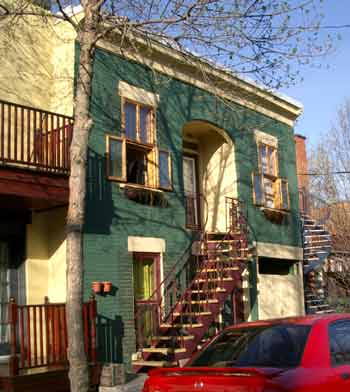
CHEZ NOUS
This is our street in Montreal; the green house is where we're living, in the upstairs apartment on the right.
We're settling in, and it feels very good. We're going extremely slow, for us; didn't even leave the house until 3:00 pm yesterday, and until now I've barely written a word. I don't think either of us realized how tired we actually were.
After going up to the huge public market yesterday afternoon, we came back, had some tea, took a walk in the neighborhood, bought some fish and a couple of local beers, and then made dinner together (olives and marinated eggplant and French bread, then artichokes, broiled Atlantic salmon, and salad with delicious fresh tomatoes, avocado, and tiny Armenian cucumbers.) We’ve spent quite a while today just sitting quietly or lying on the bed, listening to the wind and the occasional gull, or flock of geese flying overhead. The apartment is generally quieter than our house at home (although there is a good party going on right now in an apartment across the back) and I can feel us unwinding for the first time in a long, long time.
I told J., as we were listening to the voices coming from the party, where there was a small grill set up on the balcony and people going in and out, that here home life seems much simpler, and lived on a smaller scale, because so much of life happens outside one’s apartment. At home in the country, because there are so few outside resources, one ends up expecting one’s own home to be a park and a laundry, a gourmet restaurant serving multi-ethnic cuisine, a spa, a movie theater… and being steeped in old, hippie self-sufficiency, we’ve always done or fixed most everything ourselves. “And we do a pretty good job of it,” I said, lying on the bed, listening to the wind in the big tree behind the apartment, “but, my God, it’s exhausting.”
10:42 AM
|
|
|